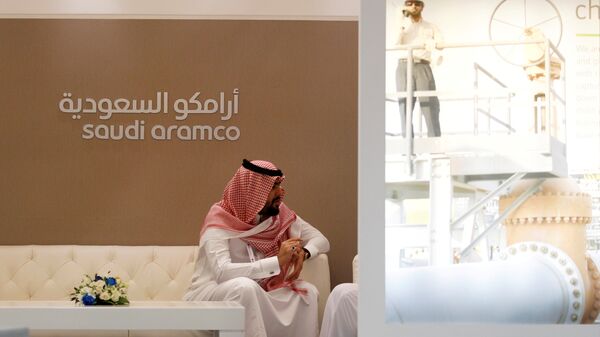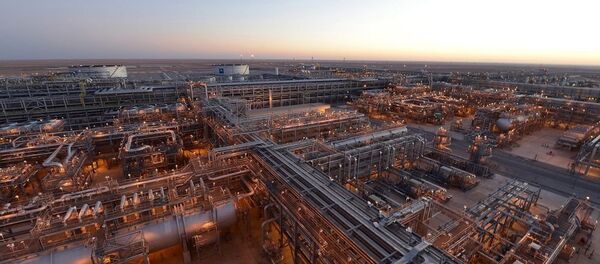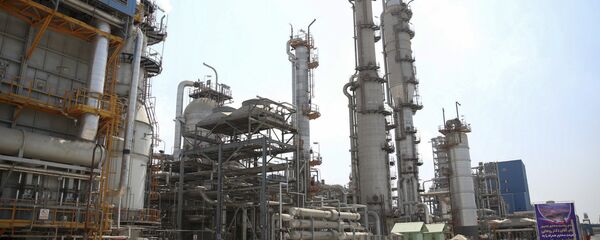Oil giant Aramco was born out of a 1933 exclusive concession agreement that Saudi Arabia granted to Standard Oil of California (Socal), which was later joined by three other American companies, to explore oil in the kingdom.
READ MORE: Saudi Arabia Testing Blockchain for Quality Checks in Oil, Gas Sector — Aramco
What made the Saudi oil concession unique is that it became the only concession in the Middle East to have been exclusively owned and operated by Americans for 47 years.
Despite initial setbacks in discovering black gold in the kingdom, American drillers and geologists managed to locate a field with staggering reserves. The long-hoped-for finding was likely the main reason for Washington to declare that “the defence of Saudi Arabia is vital to the defence of the United States” at the height of World War II.
The compromise to which the United States and Aramco stakeholders agreed became known as the “golden gimmick” – a tax credit that ensured that the burden of providing revenue for the kingdom would be shifted to the US taxpayer rather than Aramco shareholders.
From that very moment, the revenue the company paid to Riyadh in tax monies was exempt from taxation in the United States, while its headquarters were relocated from New York to Dhahran.
Seemingly satisfied with its victory, Riyadh waited another 23 years before pursuing a multi-phased strategy of a smooth takeover of Aramco, using oil revenue to buy the company from its American “parents”.
READ MORE: Saudi Arabia to Produce Oil With ‘Near Zero’ Emissions — Aramco CEO
The process, which kicked-off in the aftermath of the 1973 oil crisis, took a couple of years, with the kingdom gradually increasing its interest in the company and gaining complete control of Aramco in 1980.
Not only did the Saudis manage to keep all contracts with the Americans as a legacy by paying compensation, they actually ensured continuity of the managerial structure and technical skills, having retained US employees.
Riyadh’s approach marked an obvious shift from a typical Middle Eastern way of nationalisation: in comparison, Iraq went the “full expropriation” route, forcefully taking over all assets of the British-controlled Iraqi Petroleum Company in 1972.
“The transfer of ownership did not even make the petroleum and financial newspapers…The contrast with other, often violent oil company nationalizations was stark and obvious”, Ellen Wald writes in her book “Saudi Inc: The Arabian Kingdom's Pursuit of Profit and Power”.
With or Without IPO: Any Prospects?
Saudi Energy Minister Khalid al-Falih has recently announced that Saudi Aramco is planning to launch its long-delayed initial public offering (IPO) within two years.
READ MORE: On Trump's Hook: Why Saudi Arabia May Hesitate to Cut Oil Output
While preparing for the prospective listing, Aramco opened its books for the very first time this week in what may be perceived as its initial step to engage with global capital markets.
“The significance is that Aramco has until now been very intransparent. The disclosure is not just income, but also production cost and earning per barrel, as well as Aramco's contribution to the Saudi budget. What it shows is that Aramco accounted for 63 percent of the Saudi budget in 2017 and that its income per barrel was lower than that of comparable non-state owned companies such as Shell or Total. That data is very important for any future IPO”, James Dorsey, senior fellow at the Rajaratnam School of International Studies in Singapore, says.
The company’s value was estimated at $2 trillion, and Saudi Arabia allegedly expected to raise roughly $100 billion by listing shares of Aramco on the stock market.
Since then, the listing, which was planned for 2018, has repeatedly been delayed, and some analysts think that the long-promised IPO may never see the light of the day.
“They have been talking about selling or putting Aramco on [the] stock market for about three years or four years now. And there’s [a] kind of resistance within Aramco – the reason, as I mention, [is that] it’s the best managed company in the country and there’s a feeling that there’s no need to go this extra-mile to sell stocks in the best things the country has… probably this announcement — that it is the most profitable country in the world – will make it more attractive and [is] probably one way to get higher price if they decided to go ahead with selling some stocks in Aramco”, Gawdat Bahgat, professor of national security affairs at the National Defence University's Near East South Asia Centre for Strategic Study, says.
The views expressed in this article are solely those of the speaker and do not necessarily reflect the official position of Sputnik.







